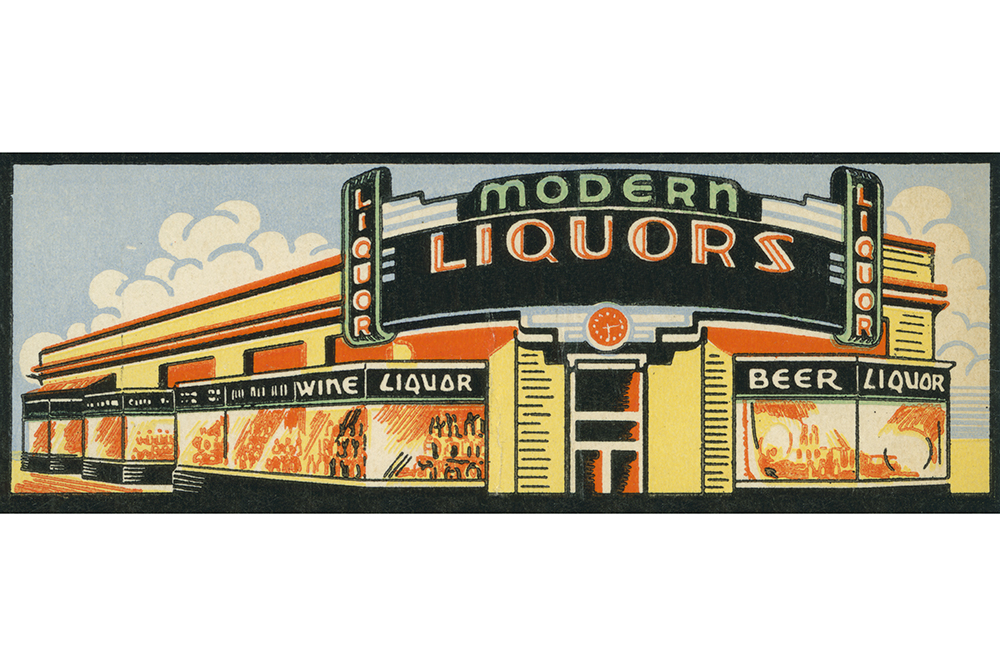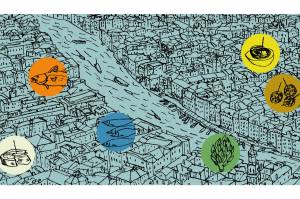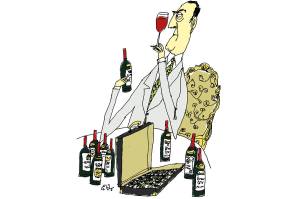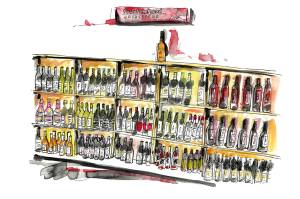This article is in
The Spectator’s inaugural US edition. Subscribe here to get yours.
‘No nation is drunken where wine is cheap,’ Thomas Jefferson famously said, laying the blame for insobriety firmly on ‘ardent spirits’. The third president was a notorious wine-fancier with a particularly soft spot for Sauternes, yet it is true that countries with a long history of winemaking tend towards more easeful drinking. Despite the ghastly interregnum of Prohibition, America has become a serious wine-producing nation — and yet ardent spirits seem to have left far stronger a mark, on the national mindset and on the nation’s prose.
I’m an English wine writer with a strong taste for American prose, and I find the differences between our nations’ attitudes to drink, especially wine, interesting. There is no question of better or worse: A.J. Liebling is my writing hero, M.F.K Fisher another role model, and I love many of the novelist Jay McInerney’s wine columns. In addition, the saying that what happens in the evening in the US reaches Britain by morning remains true: just look at the columns of factual wine writing and detailed tasting notes in either place. Or ask Robert Parker.
Still, there is a strain of whimsicality in some English wine writing that is notably absent across the Atlantic: what one might, if one has read Brideshead Revisited, refer to as the leprechaun school (‘it’s a little, shy wine like a gazelle…like a leprechaun…like a flute by still water’). American drink writing, by contrast, tends to be self-flagellating: the recovering alcoholic’s remembrance of sins safely past, or Hemingway promising to do sober what he said he would when drunk, as a lesson in keeping his mouth shut. I believe there may be conclusions about national character, or at least about characteristic attitudes to drink, to be drawn from these different approaches to writing about it. In vino veritas, the Ancients said, although I always think of Dr Johnson’s response: ‘That would be useless to a man who knew he was not a liar when sober.’
We can talk about Puritans, although they were generally not anti-drink but anti-drunkenness: Cotton Mather called drink ‘the good creature of God’. Or we can consider the long tradition of wine drinking in the UK, among the upper classes at least, and the nostalgia (currently toxic, but let’s not go there) for the glorious – and thirsty — Britain that made the wine industries of southern Spain (sherry) and northern Portugal (port), long after we’d popularized Champagne.
America, in contrast, was suckled on hard cider and harder liquor, and Prohibition was in some senses a distillation of that. And a response to other national problems. The 18th Amendment reduced all American adults to the status of teenagers: those who shouldn’t consume alcohol because they weren’t fully equipped to handle it. Women had been fierce advocates of Prohibition, thanks to the mistaken belief that removing easy access to this medicine their men took for life’s hardships would somehow cure the sickness. The liquor industry responded by blocking women’s suffrage — what became the 19th Amendment was first introduced in 1878, then held up in Congress for 42 years and passed, not coincidentally, the year after Prohibition became law. Then there is the nasty seam of racism and anti-Semitism running through the temperance movement. Germans brewed; many Jews were in the liquor business. And as for the Eucharist-supping Catholics…all those pre-Prohibition saloons? Filled with immigrants, claimed the antis. The president of Harvard announced that drinking would bring on the destruction of the white race. The upshot was the odd decision, for a country that had fought so hard for self-determination (tossing all that tea into Boston Harbor after, rumor has it, a great deal of fortifying rum punch), to remove its citizens’ right to dilute the amount of harsh reality they were obliged to swallow unmoderated.
The resulting ban was harder, from a literary perspective, on wine than on spirits. Terrible liquor can be glamorous: the Jazz Age still sings to us of cocktails, speakeasies, the mystique of the martini. Terrible wine, however, is just terrible. It took decades for America’s wine industry to recover from Prohibition, but the country’s self-excoriating self-image as a drunken nation, forever on the verge of drowning in a vat of 100 proof, seems to have remained.
In England, there is a certain willful refusal to face consequences (again, see current political developments — preferably through an alcoholic haze). This means you frequently find writing that manifests an unproblematic enjoyment of alcohol in all its guises, even those that aren’t, strictly speaking, enjoyable. Has anyone ever written a more entertaining description of a hangover than Kingsley Amis, in Lucky Jim? ‘Consciousness was upon him before he could get out of the way,’ it begins, before going on to put Amis’s decades of research at the bottom of a glass to pithy, evocative use.
America is more willing to face the vicious effects of excess, which is laudable, although I do think that teenagers should be led gently into drinking rather than banned until 21 and then given free rein, for the sake of their livers and their prose. Nobody ever wrote well blotto, or not for long. Moderation, to my mind, should be the aim. Abstinence still has its enthusiasts — but to live well or write well is surely to treasure the moment: to inhale, in the full glass before you, the perfume of nostalgia it will soon produce.
Excess and abstinence are both toxic. This may have been Jefferson’s point; it was certainly Prohibition’s lesson. In England, we had the horror of punitive pub-closing times; not comparable to a total ban, certainly, but the brutality of the 11 p.m. shut-off can turn a moderate into a binge drinker. No writer can shake fully loose from her country’s quirks and problems; we are all partially the place we come from, and if wine writers talk of the vine’s provenance, its terroir (which they do, endlessly), this is partly with the understanding that we humans, too, express our native soil in a variety of ways. And after all, what’s the point of that, if we don’t express it to those different from ourselves? Drinking, like reading, should bring on a pleasant feeling of affinity — empathy being cheaper than wine and far more enjoyable than sobriety.
This article is in The Spectator’s inaugural US edition. Subscribe here to get yours.




















